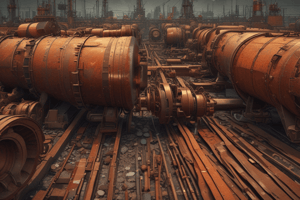Podcast
Questions and Answers
What type of corrosion occurs at the grain boundaries of a metal?
What type of corrosion occurs at the grain boundaries of a metal?
- Stress corrosion cracking
- Intergranular corrosion (correct)
- Localized corrosion
- Galvanic corrosion
Which of the following conditions is essential for galvanic corrosion to occur?
Which of the following conditions is essential for galvanic corrosion to occur?
- Presence of a protective coating
- High tensile stress
- Contact between dissimilar metals (correct)
- Localized corrosion sites
What is a significant characteristic of stress corrosion cracking?
What is a significant characteristic of stress corrosion cracking?
- Involves only physical wear and tear
- Occurs only at high temperatures
- Involves both tensile stress and corrosion (correct)
- Requires a lack of moisture
What happens in the anodic reaction during corrosion?
What happens in the anodic reaction during corrosion?
Which of the following examples correctly illustrates galvanic corrosion?
Which of the following examples correctly illustrates galvanic corrosion?
What causes localized corrosion in narrow gaps?
What causes localized corrosion in narrow gaps?
What is often required to detect intergranular corrosion?
What is often required to detect intergranular corrosion?
Why does localized corrosion lead to severe damage?
Why does localized corrosion lead to severe damage?
In the context of corrosion cells, what occurs at the anode?
In the context of corrosion cells, what occurs at the anode?
What can be done to manage galvanic corrosion?
What can be done to manage galvanic corrosion?
What is the primary cause of corrosion in metals?
What is the primary cause of corrosion in metals?
Which type of corrosion is characterized by even deterioration across a material's surface?
Which type of corrosion is characterized by even deterioration across a material's surface?
What type of corrosion occurs in confined spaces where electrolyte flow is restricted?
What type of corrosion occurs in confined spaces where electrolyte flow is restricted?
What is a key characteristic of pitting corrosion?
What is a key characteristic of pitting corrosion?
What is the chemical reaction involved in the rusting of iron?
What is the chemical reaction involved in the rusting of iron?
Which of the following is typically associated with uniform corrosion?
Which of the following is typically associated with uniform corrosion?
How does pitting corrosion differ from uniform corrosion?
How does pitting corrosion differ from uniform corrosion?
What factor is a common cause of crevice corrosion?
What factor is a common cause of crevice corrosion?
What can result from the effects of corrosion if not properly managed?
What can result from the effects of corrosion if not properly managed?
Which statement about pitting corrosion is true?
Which statement about pitting corrosion is true?
Flashcards are hidden until you start studying
Study Notes
Corrosion Definition
- Corrosion is the deterioration of materials, mainly metals, due to chemical reactions with the environment.
Corrosion Causes
- It involves oxidation-reduction (redox) reactions.
- Results in material loss, weakening, and potential failure.
- General reaction: Metal + Oxygen + Water → Metal Oxide/Corrosion Product
- Example: Rusting of iron (4Fe(s)+3O2(g)+6H2O(l)→4Fe(OH)3(s))
Corrosion Types
- Uniform Corrosion:
- Even deterioration across the surface.
- Easy to detect and measure.
- Results in gradual thinning.
- Pitting Corrosion:
- Localized, deep pits or holes forming on the surface.
- More destructive than uniform corrosion.
- Can lead to perforation.
- Crevice Corrosion:
- Occurs in confined spaces or crevices with stagnant or restricted electrolyte.
- Localized corrosion.
- Intergranular Corrosion:
- Attacks the grain boundaries of a metal.
- Common in alloys with different phases or impurities at grain boundaries.
- Can lead to material embrittlement and loss of mechanical properties.
- Galvanic Corrosion:
- Occurs when two dissimilar metals are in electrical contact with an electrolyte.
- The more anodic metal corrodes preferentially, protecting the more cathodic metal.
- Can be managed by separating dissimilar metals or using protective coatings.
- Stress Corrosion Cracking (SCC):
- Results from the combined effect of tensile stress and a corrosive environment.
- Leads to crack formation that can propagate over time.
- Can lead to sudden and catastrophic failure.
Corrosion Mechanisms
- Electrochemical reactions occur at the metal's surface, involving oxidation and reduction processes.
- Anodic Reaction: Metal loses electrons (oxidation), forming metal ions (M→Mn++ne−).
- Cathodic Reaction: Electrons are gained by other species, reducing substances like oxygen or water (O2+2H2O+4e−→4OH−).
- Corrosion Cells:
- Different areas of the metal surface act as anodes and cathodes.
- The anode experiences corrosion, while the cathode undergoes reduction.
- Example: Rusting of iron with areas of iron oxidation (anodic sites) and oxygen reduction (cathodic sites).
Studying That Suits You
Use AI to generate personalized quizzes and flashcards to suit your learning preferences.




